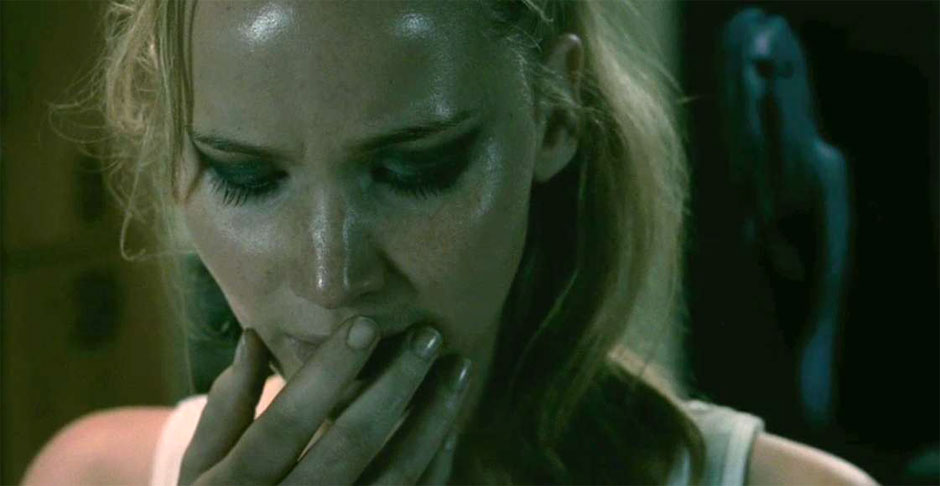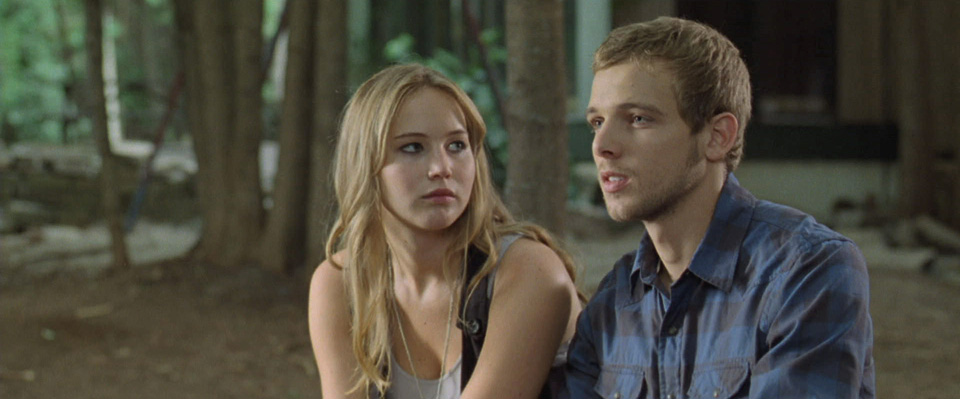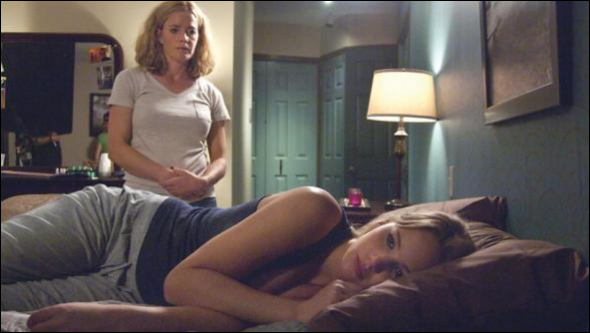House at the End of the Street Review
Max's Rating: 5/10
Fused Rating: 3.5/10
(2 reviews total)After a clunky trailer debut and confused marketing campaign,
House at the End of the Street has hit theaters well after star Jennifer Lawrence has rocketed into the A-list category thanks in large part to
The Hunger Games. And it's a good thing too, as
House remains a dud pretty much from start to finish, with little tension, character or originality. Watching
House leaves one wondering if it was shot before Lawrence made waves in
Winter's Bone, X-Men: First Class and
The Hunger Games. Turns out, it was, and thankfully has been held back until now, giving audiences a chance to fall for her as the leading lady she deserves to be.
 The film opens on a young, disturbed girl named Carrie Anne (Eva Link), who snaps and kills her parents before disappearing into the forest. Fast forward four years and the murder of the family still looms over the town as recently divorced Sarah (Elisabeth Shue) and her daughter Elissa (Jennifer Lawrence) move in next door to where the crime occurred. Taking a liking to the forest surroundings, Elissa shuns the popular crowd of the town and subsequently crosses paths with Ryan (Max Thieriot), the last surviving member of the slain family, who now lives in the house where his parents were killed by his sister. Both branded social misfits, Elissa and Ryan spend time together as teenagers do, though all the while Ryan hides a dark secret under his house that boils over and out of control.
The film opens on a young, disturbed girl named Carrie Anne (Eva Link), who snaps and kills her parents before disappearing into the forest. Fast forward four years and the murder of the family still looms over the town as recently divorced Sarah (Elisabeth Shue) and her daughter Elissa (Jennifer Lawrence) move in next door to where the crime occurred. Taking a liking to the forest surroundings, Elissa shuns the popular crowd of the town and subsequently crosses paths with Ryan (Max Thieriot), the last surviving member of the slain family, who now lives in the house where his parents were killed by his sister. Both branded social misfits, Elissa and Ryan spend time together as teenagers do, though all the while Ryan hides a dark secret under his house that boils over and out of control.
Let's get the good out of the way first: Jennifer Lawrence is a star. It doesn't matter much what she is in, she is a star. Even in a bad, bad movie, she shines. It's interesting watching her give a performance shot before any of the ones that brought her acclaim, and be able to see she has the makings of a great even then. Lawrence as Elissa makes the movie just bearable enough to watch. She's the teenager reeling from the divorce of her family and her relocation from Chicago; she is also still navigating the identity crisis that is high school. She has charm, she has vulnerability, but as Lawrence is consistently proving, she has strength. She may be the subject of the killer's eye, but that doesn't make her a victim, largely thanks to Lawrence's performance. And now that we got the good out of the way, let us be clear: House at the End of the Street is not a good movie. The only thing keeping it above water is Lawrence and even then it's not enough when you pair her up with Thieriot's Ryan, a character as bland as he is unappealing. Not to say Thieriot doesn't give it his best shot, but it doesn't help Ryan is never given an opportunity to form a cohesive thought that isn't mined from other, superior thrillers. His arc is the driving force behind the danger to Elissa, but when the reveal comes, it feels more anti-climactic than revelatory and doesn't cause us to care about his character any more. You just don't buy that he is the kind of guy that would attract a gal like Elissa, but "whatever makes a screenplay" seems to be the running theme of the script.
And now that we got the good out of the way, let us be clear: House at the End of the Street is not a good movie. The only thing keeping it above water is Lawrence and even then it's not enough when you pair her up with Thieriot's Ryan, a character as bland as he is unappealing. Not to say Thieriot doesn't give it his best shot, but it doesn't help Ryan is never given an opportunity to form a cohesive thought that isn't mined from other, superior thrillers. His arc is the driving force behind the danger to Elissa, but when the reveal comes, it feels more anti-climactic than revelatory and doesn't cause us to care about his character any more. You just don't buy that he is the kind of guy that would attract a gal like Elissa, but "whatever makes a screenplay" seems to be the running theme of the script.And about that screenplay: it's packed to the gills with cliché after
cliché, notably with mother Sarah and her attempts to be a more "present" mother despite her long hours at the ER. Shue gets a fair amount of screen time and has better chemistry with Lawrence than Thieriot, but has little to do other than act a specific type of character, and one that isn't very interesting or all that intelligent when you get down to it. As an adult, Sarah is guilty of acting more like a teenager than her own daughter, which makes her authority hard to swallow in the third act.
 The remaining sum of its parts are not much to speak of, other than minimal supporting actors who look great but should never, well, act. This is notable with the town jock/bully Tyler (Nolan Funk) who's opening shot includes him with his shirt off. It's the best part of his performance in the film's run. Elissa finds herself running with the musicians of the school in a throwaway subplot, but the lot of them get 10 lines at most as the subplot is thrown completely out the window by the end of the second act. By that time, the lack of original ideas begins to crush the film's integrity, capping off with an epilogue that is so blatantly ripping off Psycho, Paramount could sue.
The remaining sum of its parts are not much to speak of, other than minimal supporting actors who look great but should never, well, act. This is notable with the town jock/bully Tyler (Nolan Funk) who's opening shot includes him with his shirt off. It's the best part of his performance in the film's run. Elissa finds herself running with the musicians of the school in a throwaway subplot, but the lot of them get 10 lines at most as the subplot is thrown completely out the window by the end of the second act. By that time, the lack of original ideas begins to crush the film's integrity, capping off with an epilogue that is so blatantly ripping off Psycho, Paramount could sue.On it's best day, House at the End of the Street could warrant a rental if nothing else is available at the Redbox exceptThe Apparition. It's worth looking to see Lawrence in what were technically her "early days." Watching her be the only solid part in a fractured and convoluted puzzle of a movie is bearable enough, but like watching a Terrence Malick film, is something you only really need to do once. Frustrating direction, an uninspired script and weak secondary performances bring the film down to where it just can't recover. Mercifully, Lawrence already has. Simon thought:
Simon thought: "I dislike simply calling something “dumb” as the word has really been stripped of any significant meaning after being used far too much by the less eloquent. But man is
House at the End of the Street dumb — idiotic, stupid, incoherent, unintelligent, trivial, pointless, etc. The plot of this “horror film” tangles itself up with so many left-field twists and moronic character motivations it suffocates before the half way point. By the end I was so slack-jawed you could have started sticking pins into my dangling tongue and I would have been numb to the entire exercise. This is as worthless a cinematic entity I’ve seen and affronts even further by showing that Jennifer Lawrence can in fact give a bad performance. Fantasy world destroyed."
Rating: 2/10
 The film opens on a young, disturbed girl named Carrie Anne (Eva Link), who snaps and kills her parents before disappearing into the forest. Fast forward four years and the murder of the family still looms over the town as recently divorced Sarah (Elisabeth Shue) and her daughter Elissa (Jennifer Lawrence) move in next door to where the crime occurred. Taking a liking to the forest surroundings, Elissa shuns the popular crowd of the town and subsequently crosses paths with Ryan (Max Thieriot), the last surviving member of the slain family, who now lives in the house where his parents were killed by his sister. Both branded social misfits, Elissa and Ryan spend time together as teenagers do, though all the while Ryan hides a dark secret under his house that boils over and out of control.
The film opens on a young, disturbed girl named Carrie Anne (Eva Link), who snaps and kills her parents before disappearing into the forest. Fast forward four years and the murder of the family still looms over the town as recently divorced Sarah (Elisabeth Shue) and her daughter Elissa (Jennifer Lawrence) move in next door to where the crime occurred. Taking a liking to the forest surroundings, Elissa shuns the popular crowd of the town and subsequently crosses paths with Ryan (Max Thieriot), the last surviving member of the slain family, who now lives in the house where his parents were killed by his sister. Both branded social misfits, Elissa and Ryan spend time together as teenagers do, though all the while Ryan hides a dark secret under his house that boils over and out of control.
 And now that we got the good out of the way, let us be clear: House at the End of the Street is not a good movie. The only thing keeping it above water is Lawrence and even then it's not enough when you pair her up with Thieriot's Ryan, a character as bland as he is unappealing. Not to say Thieriot doesn't give it his best shot, but it doesn't help Ryan is never given an opportunity to form a cohesive thought that isn't mined from other, superior thrillers. His arc is the driving force behind the danger to Elissa, but when the reveal comes, it feels more anti-climactic than revelatory and doesn't cause us to care about his character any more. You just don't buy that he is the kind of guy that would attract a gal like Elissa, but "whatever makes a screenplay" seems to be the running theme of the script.And about that screenplay: it's packed to the gills with cliché after cliché, notably with mother Sarah and her attempts to be a more "present" mother despite her long hours at the ER. Shue gets a fair amount of screen time and has better chemistry with Lawrence than Thieriot, but has little to do other than act a specific type of character, and one that isn't very interesting or all that intelligent when you get down to it. As an adult, Sarah is guilty of acting more like a teenager than her own daughter, which makes her authority hard to swallow in the third act.
And now that we got the good out of the way, let us be clear: House at the End of the Street is not a good movie. The only thing keeping it above water is Lawrence and even then it's not enough when you pair her up with Thieriot's Ryan, a character as bland as he is unappealing. Not to say Thieriot doesn't give it his best shot, but it doesn't help Ryan is never given an opportunity to form a cohesive thought that isn't mined from other, superior thrillers. His arc is the driving force behind the danger to Elissa, but when the reveal comes, it feels more anti-climactic than revelatory and doesn't cause us to care about his character any more. You just don't buy that he is the kind of guy that would attract a gal like Elissa, but "whatever makes a screenplay" seems to be the running theme of the script.And about that screenplay: it's packed to the gills with cliché after cliché, notably with mother Sarah and her attempts to be a more "present" mother despite her long hours at the ER. Shue gets a fair amount of screen time and has better chemistry with Lawrence than Thieriot, but has little to do other than act a specific type of character, and one that isn't very interesting or all that intelligent when you get down to it. As an adult, Sarah is guilty of acting more like a teenager than her own daughter, which makes her authority hard to swallow in the third act.
 The remaining sum of its parts are not much to speak of, other than minimal supporting actors who look great but should never, well, act. This is notable with the town jock/bully Tyler (Nolan Funk) who's opening shot includes him with his shirt off. It's the best part of his performance in the film's run. Elissa finds herself running with the musicians of the school in a throwaway subplot, but the lot of them get 10 lines at most as the subplot is thrown completely out the window by the end of the second act. By that time, the lack of original ideas begins to crush the film's integrity, capping off with an epilogue that is so blatantly ripping off Psycho, Paramount could sue.
The remaining sum of its parts are not much to speak of, other than minimal supporting actors who look great but should never, well, act. This is notable with the town jock/bully Tyler (Nolan Funk) who's opening shot includes him with his shirt off. It's the best part of his performance in the film's run. Elissa finds herself running with the musicians of the school in a throwaway subplot, but the lot of them get 10 lines at most as the subplot is thrown completely out the window by the end of the second act. By that time, the lack of original ideas begins to crush the film's integrity, capping off with an epilogue that is so blatantly ripping off Psycho, Paramount could sue. Simon thought: "I dislike simply calling something “dumb” as the word has really been stripped of any significant meaning after being used far too much by the less eloquent. But man is House at the End of the Street dumb — idiotic, stupid, incoherent, unintelligent, trivial, pointless, etc. The plot of this “horror film” tangles itself up with so many left-field twists and moronic character motivations it suffocates before the half way point. By the end I was so slack-jawed you could have started sticking pins into my dangling tongue and I would have been numb to the entire exercise. This is as worthless a cinematic entity I’ve seen and affronts even further by showing that Jennifer Lawrence can in fact give a bad performance. Fantasy world destroyed." Rating: 2/10
Simon thought: "I dislike simply calling something “dumb” as the word has really been stripped of any significant meaning after being used far too much by the less eloquent. But man is House at the End of the Street dumb — idiotic, stupid, incoherent, unintelligent, trivial, pointless, etc. The plot of this “horror film” tangles itself up with so many left-field twists and moronic character motivations it suffocates before the half way point. By the end I was so slack-jawed you could have started sticking pins into my dangling tongue and I would have been numb to the entire exercise. This is as worthless a cinematic entity I’ve seen and affronts even further by showing that Jennifer Lawrence can in fact give a bad performance. Fantasy world destroyed." Rating: 2/10